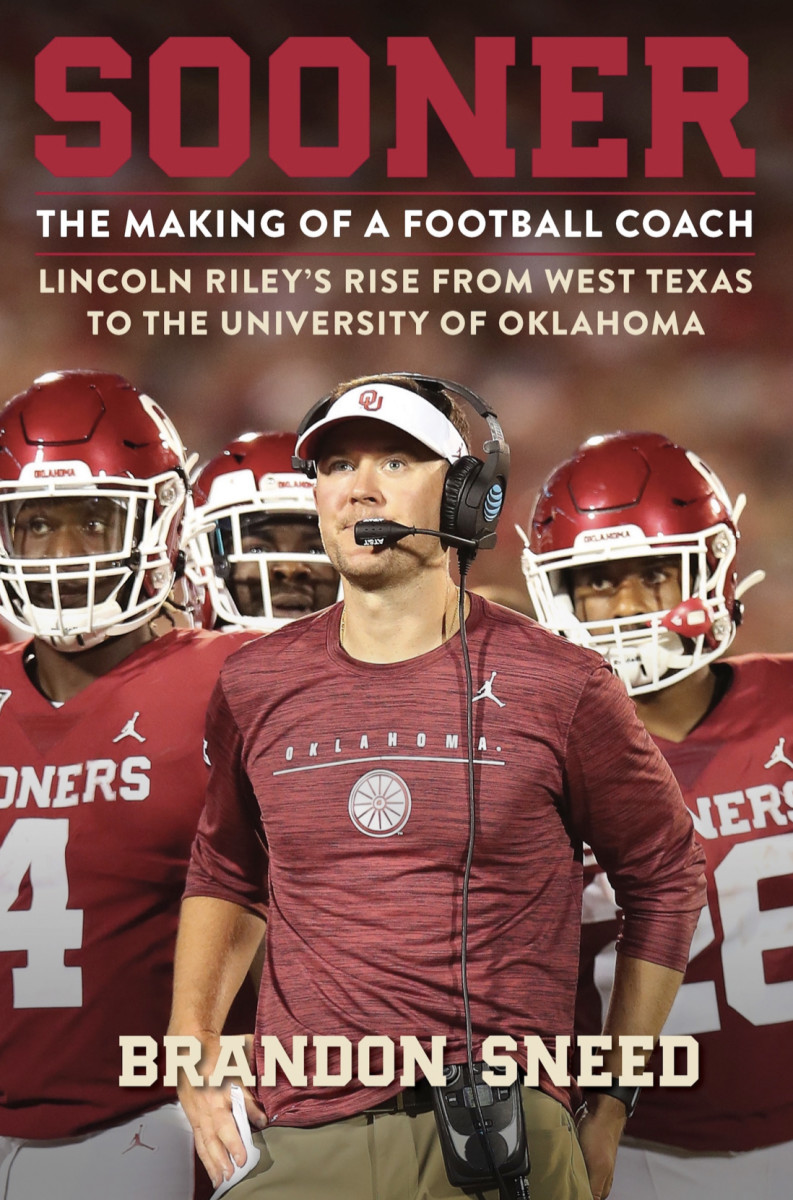From Muleshoe to Norman, New Book "SOONER" Tells Lincoln Riley's Story
That Lincoln Riley didn’t want to be involved with writing a Lincoln Riley biography is actually very on brand for Lincoln Riley.
Turns out, one’s humble Muleshoe roots don’t quite jibe with the idea of telling one’s own life story.
“Yeah, and it think it’s genuine, too,” said Brandon Sneed, author of the new Riley biography, “SOONER: The Making of a Football Coach — Lincoln Riley’s Rise From West Texas To the University of Oklahoma.”
“SOONER” (Henry Holt and Company) hit bookstores on Tuesday and recounts the coach “growing up Riley” in the dusty Texas Panhandle as a talented young high school quarterback whose football dreams were altered by a shoulder injury.

Before he decided to coach college football, Riley wanted to play college football. But one Friday night, in a mostly meaningless preseason scrimmage, he threw an interception, then got angry with himself and chased down the offending defender and, in making the tackle, badly injured his shoulder.
Riley decided to play that season anyway but had to alter his throwing motion to accommodate the pain that still bothers him today.
That string of decisions eventually cost Riley any hope he had at playing big-time football. But after Riley walked on at Texas Tech, then-Red Raiders coach Mike Leach encouraged him to get off the field and onto the sideline — and the rest is history.
“Yeah, I mean, who knows?” Sneed told SI Sooners. “Maybe he doesn’t hurt his shoulder and he walks on at Tech and Leach still sees the same coaching potential and convinces him to be a coach. I mean, you know, there’s always the alternate universe where that could happen.
“But to me … I love great movies, I love great stories and great fiction. Growing up, I loved the stories where something happens in somebody’s life that ends up having an effect on the rest of their life whether they plan to or not. A lot of times it’s something like a mistake that’s made that hurts you and you have to learn how to not let it define you and let it make you better. To me, that’s just what kind of Lincoln’s shoulder represented.”
Sneed lives in North Carolina and first heard about Riley as a grad student at East Carolina University, where Riley was offensive coordinator.
Sneed said when Riley was promoted to head coach at Oklahoma in 2017 following Bob Stoops’ sudden retirement, he pitched a profile on Riley to his editors at Bleacher Report. That turned into a book project two years later.
“And I’d even mentioned it to Lincoln back when I was working on the (Bleacher Report) story, just kind of in passing,” Sneed said. “It wasn’t like a real in-depth conversation. Just thought his story could make for a good book. He kind of laughed it off at the time saying he was too young and all that. I just felt like the story kind of told itself anyway.”
When Sneed reached out to Riley again — this time for help with the actual book — Riley politely declined. It’s not in Riley’s nature to make a big deal out of himself, or even let others do it for him.
“Some people might say that kind of thing just because they think it’s the right thing to do, which isn’t bad either,” Sneed said. “But I think Lincoln really feels that way about it. That was something that really stood out to me just the small bit of time I was fortunate enough to spend around him and talking with him and stuff like that.
“The thing he always enjoyed talking about was how other people helped him, the talent of his players, things like that. He’s aware that he’s a smart guy, but he really believes, earnestly, at least my impression of it, he really, earnestly believes that he couldn’t do this without everybody around him. Which, of course, is true. He just really seems to take that to heart. … That’s just who he is.”
While researching the original Bleacher Report story, Sneed spend almost a week in Norman, he said. While researching the book, he spent a week or so in either Lubbock or Riley’s hometown of Muleshoe — but he flew into Austin, rather than Lubbock or Amarillo, and drove seven hours, Sneed said, “because I wanted to get a feel for the whole West Texas vibe. I had never been there. So that was really cool.
“And Muleshoe, it really is this little town that is, in all the best and maybe worst ways, just kind of in the middle of nowhere. It’s just surrounded by these West Texas plains that can feel like, in one minute, they can be really inspiring and moving, you’re on this island, and then in the next minute it can be a little suffocating because there’s nothing around you.
“It’s just a sweet little town. I spent a lot of time talking to different people in town. They were all nice as can be. Couple good restaurants in town with just legit good food. Stayed at this little roadside hotel with a couple cats hanging outside my door every night, and that was fun for a couple nights. And the sunsets there are just incredible, too. I don’t know if that’s corny, but I just remember those sunsets being just breathtaking.”
Sneed said when it comes to talking about Riley, the people of Muleshoe “just love him to death.”
Even with all that background — from Leach, from Ruffin McNeill, and from those who knew Riley back in the day — Sneed said he was “conflicted” about writing a book about a person who didn’t necessarily want a book written about him. But he went ahead with it because he feels Riley’s story can inspire readers.
“I talk about his personal life a little bit, but I don’t feel like I got into anything that’s too personal,” Sneed said. “Like, kind of just my take on his football career as this cool, coming-of-age story and learning how to deal with life when your dreams fall apart because of a mistake you made and what you do after that, kind of how you heal and move forward.”
Sneed also said he’s “nervous” about reaction to the book, from Riley himself to the masses in Sooner Nation, but said it’s OK because he worries “about everything.”
On a video press conference Tuesday afternoon, Riley said it was “kind of a tricky thing” to have a book written about yourself at such a young age and so early in his career.
“The author of the book was very kind, very open with us, and, certainly appreciated it. Just, after thinking about it a little bit, we made the decision not based on who the author was, not based on the direction of the book or anything like that. I just didn’t feel like I was at a point in my career where I, one, needed or just was ready to be a part of a book.
“So we respectfully declined to be a part of the process. Not, again, had nothing to do with the author. I’m sure it’s a — I know there was great intentions there. And no, I have not read it. I certainly appreciate the gesture, and hope that it can be a positive thing. But I got a long, long, long way to go before anybody should think about writing a book about me.”
Said Sneed, “The conversation he had with me was, he just felt like he was too young to be part of a book project like that,” Sneed said. “I think it just comes down to feeling humble, he didn’t want to get too — just didn’t want to participate in it. Because I mean, you think about writing a book about somebody, it’s usually somebody who’s older and all that different stuff. But like I told him, it’s just a great story.
“I’m not trying to make him look like Jesus or anything like that. I just thought it was a great story that was inspiring and really had this neat, narrative art to it that really just reminds me of a good movie. Some of my favorite kinds of novels are just like the boy having to learn to grow up. That’s really what it’s all about.”
To get the latest OU posts as they happen, join the SI Sooners Community by clicking “Follow” at the top right corner of the page (mobile users can click the notifications bell icon), and follow SI Sooners on Twitter @All_Sooners.
